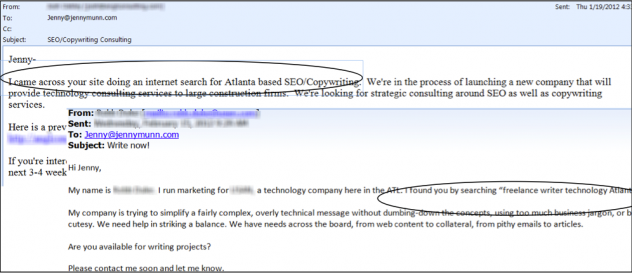Great guest post from fellow commercial freelancer (and fellow Atlantan), Don Sadler. Don’s carved out quite a lucrative niche in his area of specialty, and how it all came about is a good story. I hope it can serve as a good discussion catalyst, and can spur others who’ve either been there as well (or may be in the future) to weigh in! Thanks, Don! Enjoy!
*****************
It’s probably the most challenging (and scariest) part of becoming a freelance commercial writer (FLCW): Making the transition from a full-time job, with a regular salary and benefits like health insurance, paid holidays and paid vacation, to a full-time freelancer — with none of the above.
I made this transition myself almost four years ago. I wish I could say that I was fearless and brave and decided to make the jump on my own, but that’s not what happened. Instead, I got the dreaded layoff call, letting me know that my position as an editor with a major custom publishing company “was being eliminated.â€
Not exactly the best way to start your weekend! But now, nearly four years later, I can see that it was actually the best thing that could have happened to me professionally. I had wanted to strike out on my own as a full-time commercial freelancer for a while, but the (apparent) comfort and security of the salary, benefits, etc. were tough to give up. And I had a pretty good job, so there wasn’t a lot of urgency to jump ship.
What follows is a brief account of how I made the transition from full-time employment to full-time freelance. Everyone’s situation is unique, so my intention isn’t to provide a step-by-step “here’s how to do it†guide. Rather, I hope that by reading my story, you might pick up a couple of nuggets that could help you make the transition if this is something you want to do. Or at least be inspired that it doesn’t have to be as terrifying as it seems!
Going Back to the ‘80’s
My first professional job out of college (where I majored in Journalism) in 1985 was as a staff writer with a newsletter-publishing firm in Ft. Lauderdale. I worked there for 12 years before moving to Atlanta to work for another publisher in 1997, which in turn was acquired by another custom publisher in 2005, for whom I worked until early 2009.
So, I had about 24 years of professional experience as a writer/editor before going full-time freelance. But the biggest factor in the success of my transition was this: I had spent pretty much this entire time specializing in a couple of content niches: business and finance. As a result of this specialization, I was able to immediately “brand†myself as an expert when it came to writing content in these areas. This turned out to be huge for two reasons:
1. There is a high demand for freelance writers who can tackle these subjects without having to be brought up to speed on basics like the difference between defined contribution and defined benefit plans or the nuances of various banking and financial products and services.
2. Therefore, these freelance writers can generally charge relatively high rates for this type of writing.
The second thing that helped me make a successful transition fairly quickly was the fact that I started doing freelance work “on the side†long before I ventured out on my own as a full-time FLCW.
One of the first things I did when I moved to Atlanta in 1997 was start looking for freelance work. It didn’t take long to land gigs with a couple of business magazines, from which I was able to get pretty steady assignments. Over the decade-plus that I did freelance work on the side, I built up a nice little freelance clientele that eventually formed the foundation for going full-time freelance.
In addition to providing a little “mad money,†this part-time freelance work was invaluable in helping me get my feet wet and learn about how the freelance world worked. Just as importantly, it gave me a sense of “entrepreneurship†and what it was like to look for and gain clients on my own. I found it tremendously exciting and rewarding to land new freelance clients, make them happy and get paid for doing it!
What Should I Do?
Due to these three factors—my long history of experience as a professional writer/editor, albeit as an employee; my well-established content niches of business and finance; and my 10+ years of on-the-side freelance experience—I was about as well-positioned as you can be to make the transition to full-time freelance. And since I kind of saw the layoff coming for at least six months, I had even started to think about what I would do if and when I lost my job: Try to go full-time freelance or look for another job?
I got my layoff notice at 4:00 on a Friday afternoon (which is by the corporate textbook, by the way). Since I was a remote employee and worked from home, I immediately fired off emails to two of my freelance clients letting them know what happened and that I was available for as much freelance work as they could send me. They both replied before 5:00 and said they would have work for me Monday morning.
I took that as my sign that I should give full-time freelancing a real shot before looking for another job. And by the end of my first year of full-time freelance, I was consistently meeting or exceeding my old monthly salary.
Are there other challenges to being a full-time freelancer beyond just landing clients and generating income? You bet! Health insurance, for example, is one of the biggest, but that’s been discussed in another post on this blog. But in my experience, if you can get the freelance ball rolling down the hill, it tends to pick up speed if you are diligent and work as hard at building your freelance business as you did working for an employer.
Lay the Groundwork Now
Like I said, I didn’t write this with the intention of providing a step-by-step guide to transitioning from full-time employment into full-time commercial freelance writing. I realize that not everybody out there has more than two decades of professional writing and editing experience as an employee, or has been able to cultivate a profitable content niche like I was fortunate enough to do.
But if going full-time freelance is something you think you’d like to do one day, I encourage you to start laying the groundwork now. For me, success as a full-time FLCW was far from “overnightâ€; it was actually more than two decades in the making!
The best advice I can offer is to start doing freelance work on the side from your regular job now. This will help you learn how the freelancing world works and start to build up a small clientele that you can expand when you devote your full-time energy and effort into your own freelance writing business.
Oh, and buy The Well-Fed Writer! I read it about three years after I struck out on my own and I can’t imagine a more practical, hands-on guide to getting started as a freelance commercial writer. Peter confirmed some of the things I was doing and offered some great new tips and insights I hadn’t thought of.
And no, Peter didn’t ask me to say that—it’s really that good!
1. What has held you back from making the transition from an employee to a full-time FLCW?
2. If you’ve made the transition, what are one or two tips you can offer to others who hope to do the same?
3. What is one mistake you made during the transition that others should guard against?
 Don Sadler is an Atlanta-based freelance commercial writer specializing in the areas of business and finance. He writes content for all different types of media, both print and electronic, and in all different formats — print and e-newsletters, magazines, search-engine-optimized websites, white papers, blogs, ghost articles and books, etc. Visit http://www.donsadlerwriter.com to learn more.
Don Sadler is an Atlanta-based freelance commercial writer specializing in the areas of business and finance. He writes content for all different types of media, both print and electronic, and in all different formats — print and e-newsletters, magazines, search-engine-optimized websites, white papers, blogs, ghost articles and books, etc. Visit http://www.donsadlerwriter.com to learn more.
Want to be a guest blogger on TWFW Blog? I welcome your contribution to the Well-Fed writing community! Check out the guidelines here.




